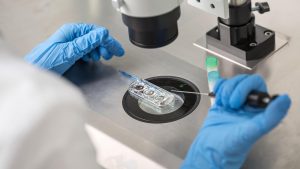Embarking on an IVF journey is often an emotional experience, filled with numerous questions about what to expect during each phase of treatment. One common concern for many couples is whether it is safe to have intercourse after an embryo transfer. This step in the IVF process is highly anticipated, and patients may be wary of doing anything that might negatively impact the chances of a successful pregnancy. It’s natural to feel protective over your body and the embryo you’re hoping to nurture into a pregnancy, and the uncertainty surrounding what is safe or not can be stressful. The idea that physical activities, especially sex, might harm the embryo or lead to its “falling out” can heighten these concerns. In this article, we’ll break down the myths and facts surrounding post-embryo transfer intercourse, providing clarity on what is safe for you and your partner as you navigate this significant time in your IVF journey.
Many clinics will tell women to refrain from having intercourse after the embryo transfer for up to 48 hours to 2 weeks. This was originally advised because it was thought that the introduction of infection and uterine contractions caused by an orgasm would have a negative impact on implantation and possibly harm the embryo.
There is, however, there is no scientific evidence to prove this is true. Providing you’re sensible, having sex after your embryo transfer will not have any adverse effects on your embryo and it is impossible for it to simple “fall out”.
It is important to abstain if you’re uncomfortable or experiencing discomfort. Some patients do not want to have intercourse after an egg retrieval if they’re feeling sore or bloated from the procedure.
So is it safe to have intercourse after your embryo transfer? The short answer is yes, it is perfectly safe providing you are sensible and you’re not feeling uncomfortable. Your embryo cannot be harmed or “fall out” and studies have shown that there are no adverse effects if you decide to have sex after your embryo transfer.
In fact, there is evidence that seminal fluid contains several growth factors that can help implantation. Going through IVF treatment is a stressful and emotional journey, so it is also very important for couples who are undergoing treatment to maintain their intimacy and not feel concerned that by doing so, there will be a negative impact on their embryo.
It’s completely normal to have questions and concerns during your IVF journey, especially when it comes to what can and cannot be done after an embryo transfer. Remember, every individual’s experience is unique, and listening to your body is key. If you’re ever unsure, it’s always best to consult your fertility specialist for personalised advice. For those looking for more information, our what can I do after an embryo transfer guide offers additional insights to help you feel confident in the steps you’re taking to support a successful pregnancy. Staying informed and maintaining open communication with your medical team will ensure you’re taking the right precautions while also allowing yourself to relax and focus on your well-being.

Not yet at the embryo transfer stage?
Welcome to Fertility First, where we are dedicated to providing comprehensive fertility care. As a leading Australian fertility clinic, we go the extra mile by routinely conducting sperm DNA damage scans in male patients. Our primary focus is on understanding your individual needs and exploring every possible fertility treatment option available to you. Located in Sydney, our fertility clinic offers a diverse range of fertility treatments that are customised to suit your specific circumstances. With our team of devoted fertility specialists, we are fully committed to supporting you on your path to conception.







